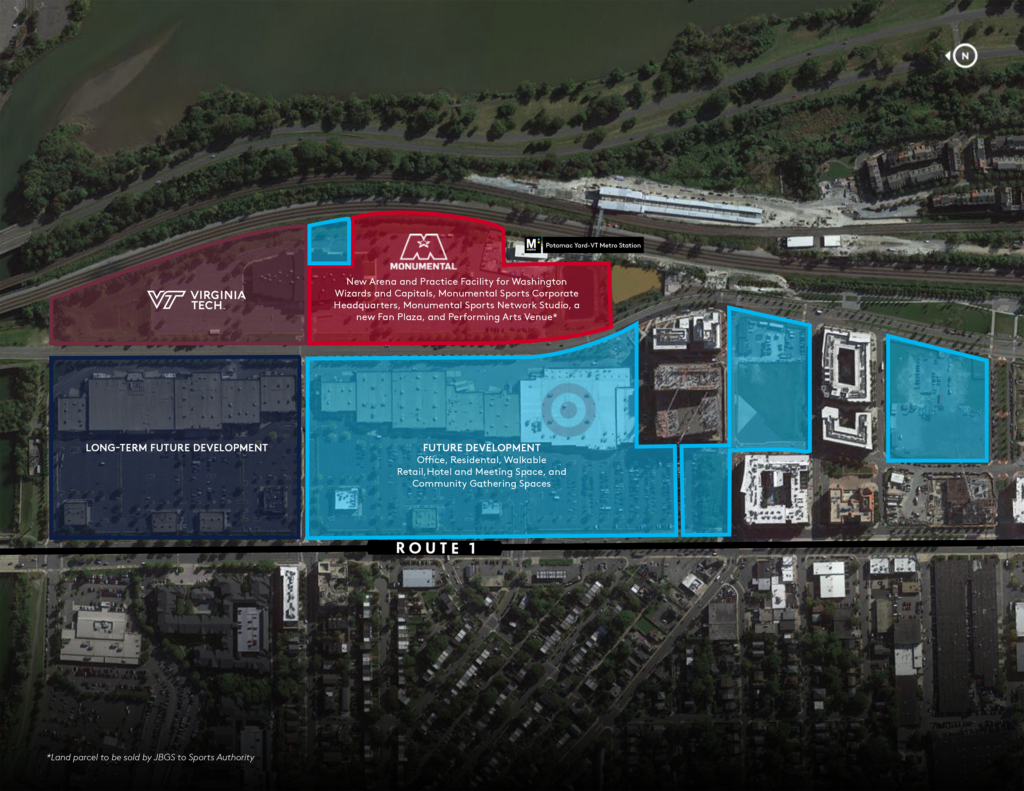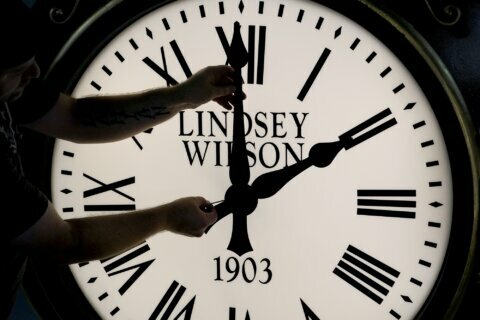Bringing the Washington Capitals and Wizards from D.C. across the river to Potomac Yard is projected to cost Virginia taxpayers more than a billion dollars. The size of that public subsidy and the other changes the projected $2.2 billion plan would bring is giving some people in Alexandria mixed feelings about the arena — and the redevelopment that would come with it.
“There’s a revenue enhancement for the area and Virginia,” Dan McGowan, of Burke, said while shopping at the Target department store in the Potomac Yard shopping Center.
McGowan believes taxpayers have a role in bringing the 70-acre Monumental Sports & Entertainment development to Potomac Yard, with Monumental and its majority partner Ted Leonsis picking up a larger share of the cost.
The project — which would include a new headquarters for Monumental, along with a state-of-the-art studio for its media network, a practice facility for the Wizards, a performing arts venue and an expanded e-sports facility — would surpass costs for any similar facility on record, leaving taxpayers an expected net cost of about $1.35 billion.
Nearly $1.15 billion of that would be specifically tied to the project, according to a study commissioned by The Washington Post by J.C. Bradbury, an economics professor at Kennesaw State University in Georgia.
A state sports authority, which would need to be created, would issue two bonds: one would be backed by tax revenues generated on-site and the other from Monumental lease payments to use the facility. This would account for roughly 75% of the funding. Roughly 18% would be a cash investment from Monumental.
Rep. Don Beyer, who represents the area of Alexandria in Congress, told WTOP his biggest concern is the use of tax-exempt federal bonds to finance the project.
“I have long supported the idea that we shouldn’t be using tax-exempt federal bonds to build stadiums for billionaires … and my understanding is that they will be using tax-exempt federal bonds, which means basically, Americans across the country are going to be subsidizing it,” said Beyer, who has been a co-sponsor of legislation “for a number of years in a row” that aims to end tax breaks for professional sports teams building new facilities.
Beyer, who lives in Alexandria, said he was more concerned about what voters think than his own taxes. Among the top concerns he’s heard from constituents so far is the impact the development would have on traffic.
“It’s going to be up to our state and local officials to balance what the neighbors want, what people in Alexandria and Arlington are willing to live with in order to get this economic bump,” said Beyer.
State Sen. L. Louise Lucas voiced her displeasure on the current deal, stating on her X account that she refuses to use state tax dollars on a new arena before delivering on toll relief and providing more for public schools in Hampton Roads.

The future for Potomac Yard Center
The proposed Monumental project includes areas of development west of the future arena, including office space and residential, retail, hotel and community gathering spaces.
Currently, the space is occupied by the Potomac Yard Center, an outdoor shopping marketplace that features multiple retail stores, including a PetSmart location with a pet hospital, a T.J. Maxx department store and Target.
It is unclear if the shopping center is included in the proposed entertainment district.
Residents currently shop at Target at Potomac Yard Center for items ranging from electronics to groceries. For people like Wilfred Rodriguez, of Alexandria, the store isn’t just convenient — but essential.
“My pharmacy is here, so I’ll just stop here on my way from work to home,” said Rodriguez.
While the possible new Monumental project is leaving some shoppers concerned about the store’s future there, Beyer — who told WTOP he shops there too — said it’s his understanding “Target would stay, probably bigger and better, but just at a different location on that property.”
WTOP has reached out to Potomac Yard Center landlord JBG Smith and Target for comment.








